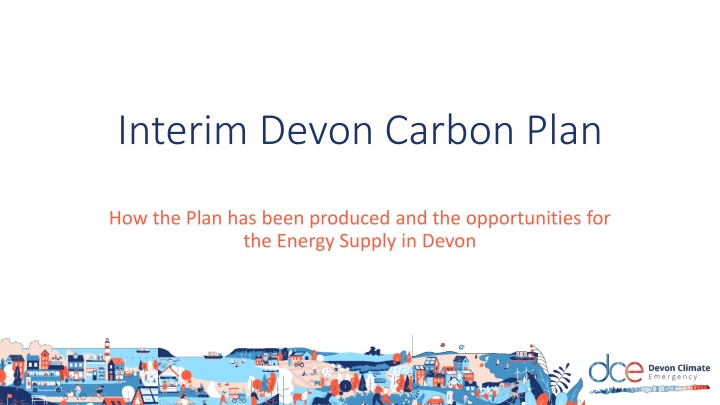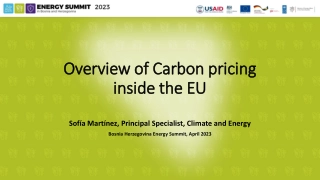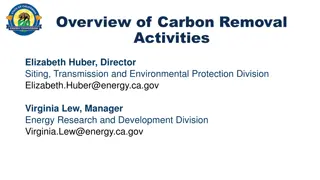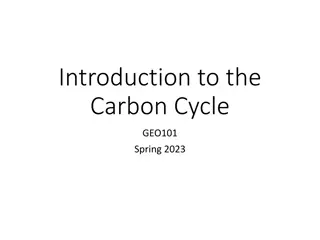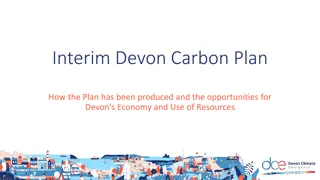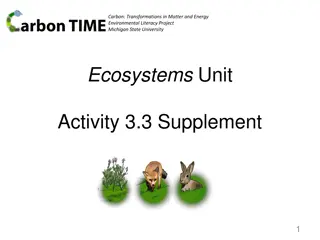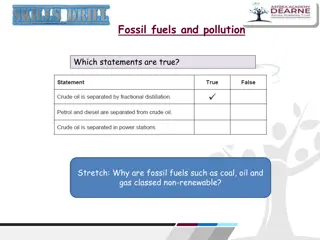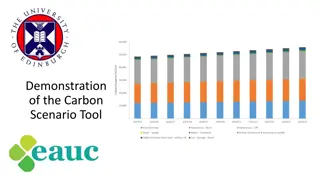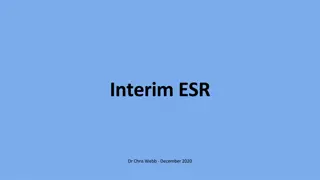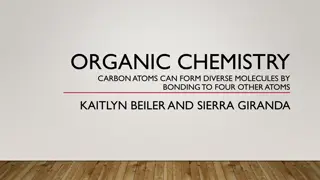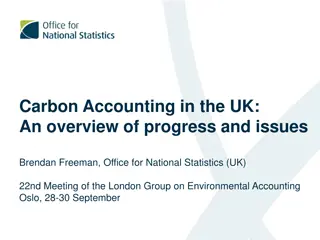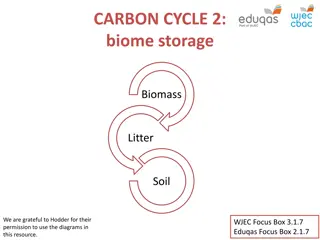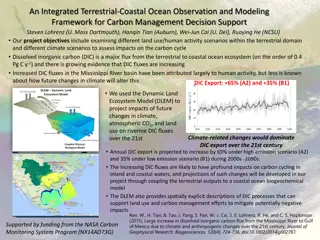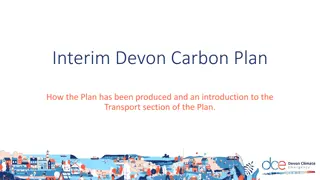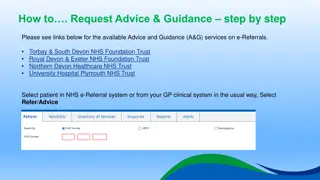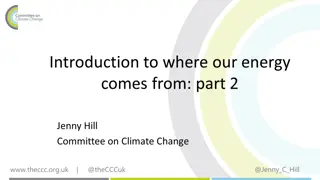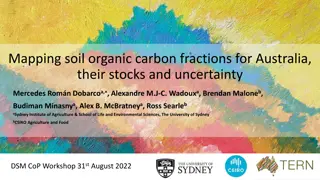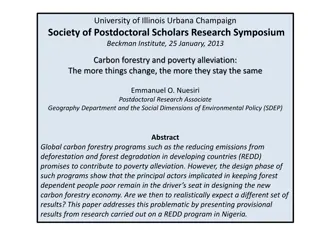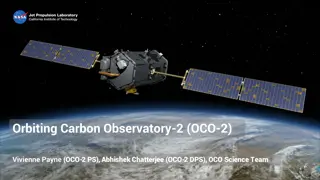Interim Devon Carbon Plan
The Interim Devon Carbon Plan outlines the production process and energy supply opportunities in Devon. It focuses on achieving net-zero carbon emissions by 2050, improving environmental resilience, and preparing communities for a warmer world. The plan discusses the practical challenges, costs, and co-benefits of reaching net-zero and emphasizes the need for new resources and funding.
Download Presentation

Please find below an Image/Link to download the presentation.
The content on the website is provided AS IS for your information and personal use only. It may not be sold, licensed, or shared on other websites without obtaining consent from the author.If you encounter any issues during the download, it is possible that the publisher has removed the file from their server.
You are allowed to download the files provided on this website for personal or commercial use, subject to the condition that they are used lawfully. All files are the property of their respective owners.
The content on the website is provided AS IS for your information and personal use only. It may not be sold, licensed, or shared on other websites without obtaining consent from the author.
E N D
Presentation Transcript
Interim Devon Carbon Plan How the Plan has been produced and the opportunities for the Energy Supply in Devon
1. Welcome Your Host Kerry Hayes Member of the Net-Zero Task Force; Project Manager, Regen Ian Bailey Professor of Environmental Politics, University of Plymouth Speakers: Emily Reed Kate Royston Project Manager, Devon Climate Emergency Director and Energy Advisor, Tamar Energy Community Hannah Oliver Communications Lead, Devon Climate Emergency Sophie Phillips Chair, South Dartmoor Community Energy
Agenda 1. Welcome 2. Background to the Devon Climate Emergency 3. Introduction to the Interim Devon Carbon Plan 4. What needs to happen? 5. Keynote discussion 6. Question and Answer Session 7. Next Steps
2. The Devon Climate Emergency Creating a resilient net-zero carbon Devon where people and nature thrive Objectives: Partnership: Reduce carbon emissions to net-zero by 2050 at the latest Improve the resilience of Devon s environment Prepare communities for a warmer world
2. Devon Climate Emergency Project Structure: Devon Climate Declaration
3. The Interim Devon Carbon Plan Engagement A plan for everyone one in Devon Focuses on the strategic issues and it nests with plans at other levels
3. The Interim Devon Carbon Plan Date for Net-Zero Your Opinion The Plan describes what needs to be done to reach net-zero Provides a trajectory to meet net-zero by 2050 Indicates the costs, opportunities and co-benefits of 2050 Discusses the practical challenges of achieving net-zero ahead of the national timetable e.g. 2030 and 2040 Specific consultation question
3. The Interim Devon Carbon Plan Funding: Geography: The Plan makes clear that net-zero cannot be achieved within existing resources and policy. The current funding status of each action is described. Most need new resources. Significant opportunities for individuals to redirect purchasing power e.g. shifts food purchasing patterns. Devon s rural nature is a challenge and an opportunity. Some net-zero actions and behaviours will be easier in town and cities. Where actions apply to a specific type of area, this is described.
3. The Interim Devon Carbon Plan Co-Benefits of Net-Zero: Create a fairer, healthier, more resilient and more prosperous society Health and Wellbeing Healthier diets, warmer homes and more active lifestyles. Prosperity New jobs and skills and retaining spending locally Environment Enhance and regenerate nature, reduce flood risk, improve water and air quality
4. What needs to happen? ENERGY Increasing renewables, introducing flexibility and capturing carbon In 2018, 62% of Devon s greenhouse gas emissions related to energy use in the form of electricity and fossil fuel in buildings, manufacturing and construction activity, and transport.
4. What needs to happen? 1. Use less energy. We need to reduce demand and use what we really need efficiently 2. Transition to renewables. e.g. wind, solar, biofuel 3. Flexibility and storage. We need to be able to store electricity and use it more flexibly. 4. Carbon Capture and storage. Where small amounts of fossil fuels continue to be used, the carbon emitted needs to be captured and permanently stored to prevent it from reaching the atmosphere.
4. What needs to happen? Key outcomes: Devon s installed renewable energy and storage capacity increases substantially bringing with it jobs and skills opportunities Innovation opportunities have been seized to test offshore technologies, such as floating offshore wind, and hydrogen infrastructure Communities become more engaged in local energy issues and energy investment New development is expanding Devon s expertise in the use of district heating systems
4. What needs to happen? Key co-benefits and opportunities of the transition to a net-zero energy system for Devon: Financial returns on the investment in new renewables If locally spent, financial returns are a benefit to the local economy. Investment could come from Devon s households, public sector bodies, businesses, banks and pension funds. Profits from renewable energy schemes owned by Devon Climate Emergency partners and communities can be invested in other local carbon reducing activity e.g. domestic retrofit. Cohesive communities owning key infrastructure become more self-sufficient, and with greater resilience
4. What needs to happen? Key co-benefits: Jobs and Skills The transition of our energy system away from fossil will support up to 192,000 jobs across Devon, Cornwall, Dorset and Somerset. Increased demand for electricity, and new technology use, provides opportunities for reskilling into electrical trades. The retention of spending on energy within the Devon boundaries, avoiding over 2 billion pounds a year leaving the local economy
4. What needs to happen? Key co-benefits: Health and Wellbeing Reduced air pollution Reduced levels of fuel poverty Public health benefits, driven by eliminating illnesses related to cold, damp homes and air pollution Less wasted energy could lead to less wasted energy and lower bills for consumers Increased deployment of smart meters and time of use tariffs
Your Opinion Poll
7. Next Steps View the plan: devonclimateemergency.org.uk/interimcarbonplan Complete the consultation online Share the consultation - tell a friend, family or colleague Attend or listen again to some of the other thematic webinars
devonclimateemergency.org.uk/interim-devon-carbon-plan-webinar-seriesdevonclimateemergency.org.uk/interim-devon-carbon-plan-webinar-series
